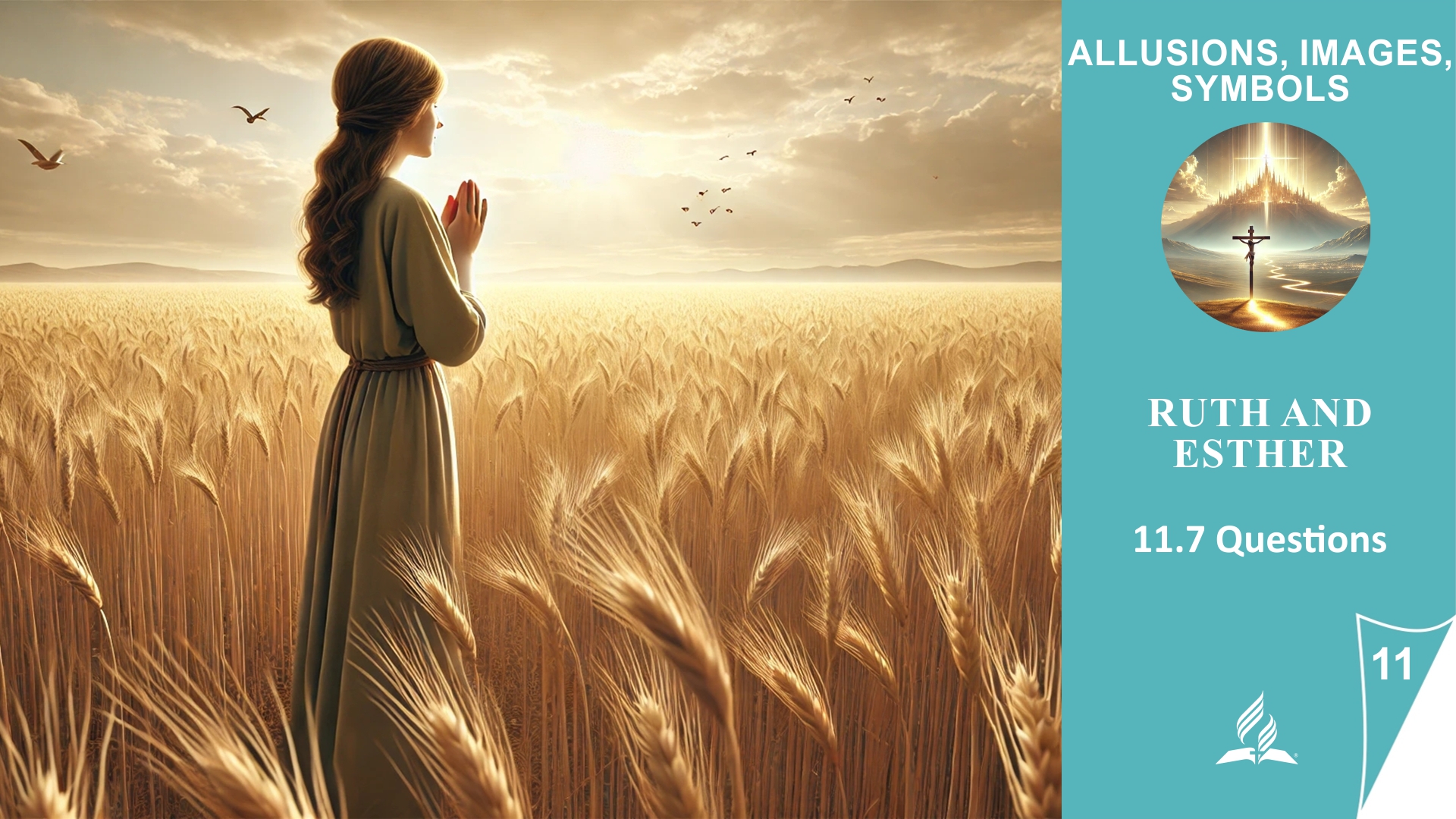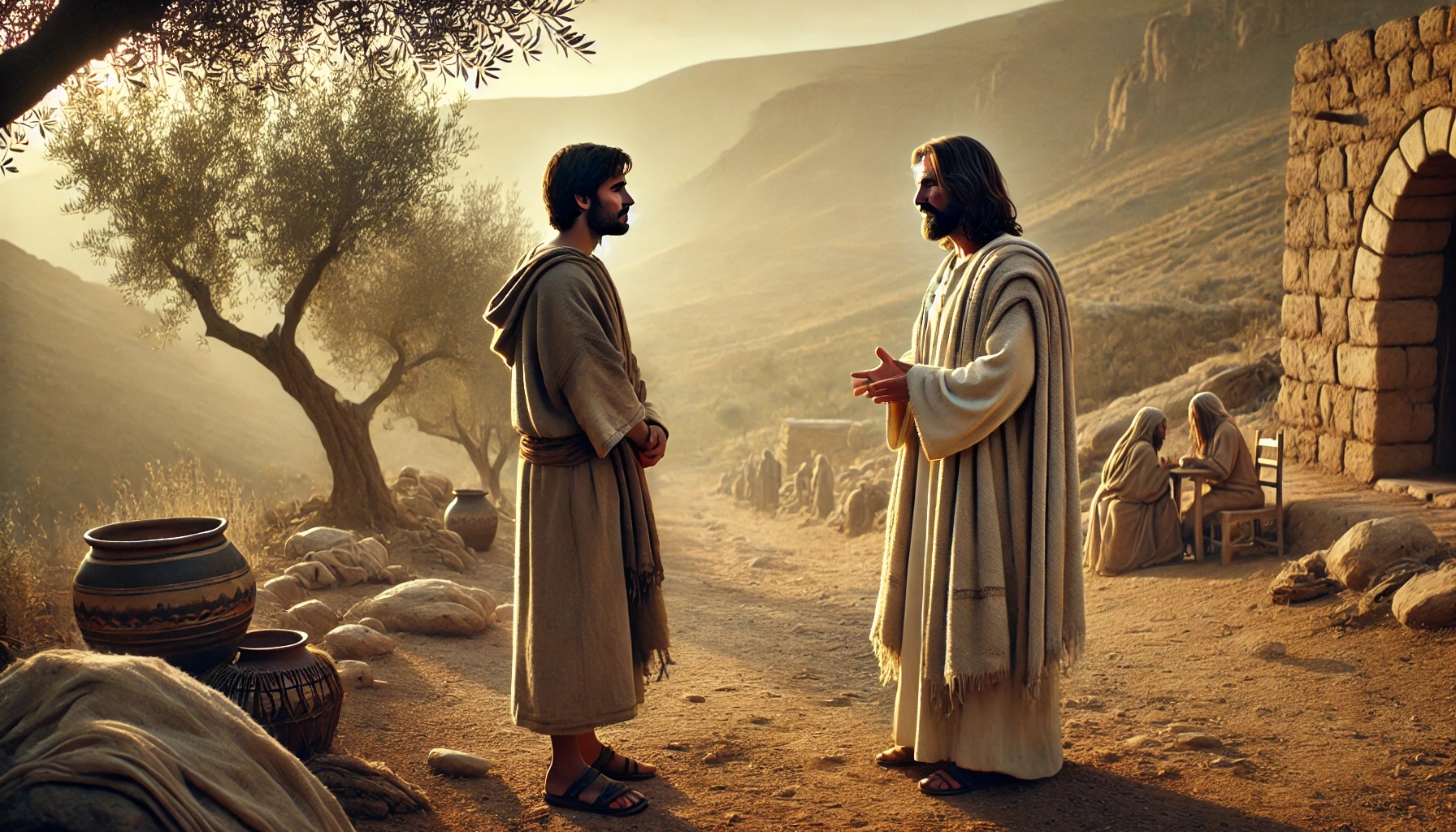

⛪ Lesson 11: Ruth and Esther
📘 11.7 Questions
………………………………………………………………….
🟦 Introduction
Life cannot be planned. It comes crashing in with its challenges, crises, and trials. Yet through the biblical stories of Ruth and Esther, we discover: God acts even where, humanly speaking, there seems to be no way out. Both women faced great distress—one as a widow in a foreign land, the other as a queen under deadly threat—and both became instruments of divine salvation. Their stories give us language for our own doubts and hope for our own times.
………………………………………………………………….
📖 Answers to the Qus
📌 Question 1: Why does God allow His people to go through difficult times?
God is not a God of escape, but of shaping. Difficult times are not divine punishment but often divine schooling. Just as gold is purified by fire, so are hearts refined in distress. Ruth had to walk through loss and foreignness to discover that God is not far, even in Moab. Esther wasn’t preserved in abundance, but confirmed in risk.
God allows trials because He sees something in us that is greater than our fear: calling, character, hope for others. Hard times create spaces where God’s greatness becomes visible—not by immediately rescuing us, but by staying faithful while we wait.
📌 Question 2: How does a believer prepare for difficulties? Where can we find hope?
A believer anchors themselves—not in circumstances, but in the character of God. Just as Esther fasted and prayed, preparation is an inward path: prayer, silence, and fellowship with other believers.
We find hope not in guaranteed solutions, but in the presence of the Holy Spirit. When everything shakes, the cross remains firm. When all lights go out, the promise still shines: “I am with you always.”
Esther didn’t enter the throne room because she felt safe—but because she knew she was not alone. This kind of preparation isn’t a technique, but a relationship with the Heavenly Father.
📌 Question 3: Why are we often drawn to the frightening parts of prophecy?
Because fear shouts. It’s loud. Hope whispers. We crave control, security—and prophecy often looks like a roadmap through the chaos. But when we make the details the center and lose sight of God’s heart, we see only the tribulation and not the goal: the wedding of the Lamb.
Ruth didn’t know any prophecy—just the next step. Esther had no eschatological scheme—but she had a calling. The good news is not the timeline, but the hand that holds it.
📌 Question 4: How would you help someone who finds Revelation frightening?
By explaining the book not as a chronicle of disasters, but as a love letter. It’s the “Revelation of Jesus Christ”—not of the beast, not of the plagues, but of the Savior. Yes, there are judgments. But they are responses to injustice, not signs of indifference.
I would say: “Read Revelation like a love letter. Behind all the struggle stands a Bridegroom who is coming to take His bride home.”
And: “It’s okay to be afraid—but you don’t have to live in fear.”
📌 Question 5: What if someone says, ‘God could never want me—not after what I’ve done’?
Then we tell them about Ruth—a foreigner, a widow, with no status—who became part of the lineage of Jesus. Or about Esther, who hid, hesitated, and yet was used.
God’s love is not based on performance. It is gracious. Relentless. And it makes space for the broken. Boaz knew exactly who Ruth was—and he loved her anyway. Jesus knows exactly who you are—and He loves you because of it.
I would say:
“You think you’re too dirty? God says: You are the one I want to wash.
You think you’re too far gone? God says: You are the one I want to bring home.”
Because love that doesn’t forgive is not divine love.
………………………………………………………………….
✨ Spiritual Principles
-
Calling is not just for the strong—it is formed in weakness.
-
God’s timing is precise—even when it feels delayed.
-
Prophecy is a window into hope—not into panic.
-
Grace doesn’t ask, “Who were you?” but, “Where will you go with Me?”
-
Redemption is a gift—not a reward.
………………………………………………………………….
🧩 Application for Daily Life
-
Talk to God like Esther—honestly, courageously, prepared.
-
Carry your “light” intentionally into daily life: family, work, church.
-
Avoid prophetic speculation—live with prophetic trust.
-
Walk with others in their questions—be a bridge, not a judge.
-
Keep a “redemption journal”: Where has God called, used, or protected you?
………………………………………………………………….
✅ Conclusion
Lesson 11 takes us to the heart of the gospel: God uses broken people in broken times to make His eternal hope visible. Ruth, Esther—and you—are not exceptions, but examples. When we are afraid, He is faithful. When we fail, He is gracious. And when we say yes, He leads us through.
………………………………………………………………….
💭 Thought of the Day
God doesn’t call the perfect—He heals the willing. Maybe you are exactly where you are because someone near you needs light. Be ready—for such a time as this.
………………………………………………………………….
✍️ Illustration – “For Such a Time as This” – The Story of Sarah
Part 1 – Lost in Security
Sarah was 32, successful, organized—and empty inside. She worked as a team leader at a major event agency in Frankfurt, planning conferences, charity galas, and influencer events. Her apartment was modern, her friends educated, her calendar full.
Yet every morning she asked herself: “What’s the point of all this?”
The faith she had learned as a child at her grandmother’s country home had been lost somewhere—between self-optimization, work-life balance, and yoga apps.
One day, her agency received a request: Could they design a program for a Christian women’s event—pro bono? She declined. No time for “Bible stuff.” But something wouldn’t let her go. Maybe it was the event’s title:
“For Such a Time as This.”
Part 2 – The Breaking Point
Six months later, everything changed. Sarah became ill. No clear diagnosis, but her body gave out. Exhaustion, emptiness, panic attacks. She quit her job and moved back to her late grandmother’s small house on the edge of the Taunus hills.
There, in an old dresser, she found a Bible—open to the Book of Esther.
“…and who knows whether you have not come to your royal position for such a time as this?”
Sarah wasn’t a queen. She was a burnt-out failure. Yet that verse struck her like lightning.
That same evening, she searched online for a church. She ended up in a small Adventist church in the next town, where she was warmly welcomed. No pressure. No fake piety. Just real people. She met Lisa—single, a social worker, full of hope. And Miriam, a former theology professor now living with Parkinson’s, but glowing like spring.
Part 3 – The Call
One evening, Sarah sat on Miriam’s porch.
“Why me?” she asked. “I’m no Ruth. No Esther. I’m not even good at praying regularly.”
Miriam took her hand. “Ruth was a foreigner. Esther hid at first. Yet God didn’t pass them by. Maybe you don’t need to be brave, Sarah. Maybe you just need to stay.”
Two weeks later, Lisa called her. A single mother from the refugee shelter had gone missing—leaving her two young children in Lisa’s care. Lisa was overwhelmed.
Sarah went.
What she found was chaos: Two distressed children, an empty fridge, and government agencies pointing fingers. In the midst of it all, Sarah did what she did best—she organized. Made calls. Sent emails. Coordinated. And at night, when everything was quiet, she sat by the children’s beds, held their little hands, and sang the lullaby her grandmother used to sing.
Part 4 – The Transformation
Sarah became the children’s godmother. The mother was found—severely traumatized, but alive. With the church’s help, she received psychological and spiritual care. Sarah walked with her. Quietly, faithfully, without religious clichés.
One day, the mother stood up in a small group meeting, tears in her eyes, and said:
“I was like Ruth—without land, without a voice, without hope. And God sent me a Boaz-woman.”
She pointed to Sarah.
Sarah shook her head. But deep inside, she knew:
God had prepared her for this moment.
Not through strength.
Not through achievement.
But through brokenness, surrender, and obedience.
Part 5 – The Revelation
A year later, Sarah was invited to speak at that very women’s event she had once declined. The theme hadn’t changed:
“For Such a Time as This.”
She stepped onto the stage. Her hands trembled. No presentation. No gloss. Just a Bible—and a story. Her story.
She spoke of weariness, doubt, the feeling of not being enough. And then she said:
“I used to think God only uses people who never failed. But then I met Ruth—widow, outsider, forgotten. And Esther—privileged, but afraid. And I learned: God uses those who make themselves available. Not despite their weakness. But through it.”
At the end, she read the verse from Esther aloud:
“…and who knows whether you have not come to your position for such a time as this?”
And she added:
“I now know—I am. And so are you.”
✨ What This Story Shows
-
God leads through detours.
-
Weakness does not disqualify—it often marks the beginning.
-
Calling doesn’t begin with strength, but with willingness.
-
Those who love become instruments of salvation—whether in the field, the palace, or a small kitchen with two sleeping children.





















